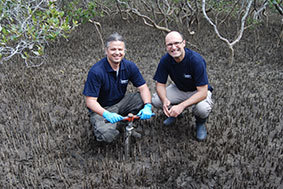The history of carbon sequestration hidden in mangroves

Southern Cross University (SCU) researchers are utilising a cutting-edge radioisotope laboratory to investigate the history of carbon sequestration and pollution during the past 150 years. Funded by the Australian Research Council, the analytical facility is based at the university’s National Marine Science Centre (NMSC) in Coffs Harbour.
“Some of the instruments we have at the NMSC are a first for Australia and enable us to measure a large number of natural and artificial radioactive chemicals,” said Professor Isaac Santos, whose research team is investigating carbon sequestration in mangroves from Darwin to Melbourne.
“We specialise in the use of natural radionuclides that can date soil and sediment samples. We are reconstructing environmental histories back 150 years, which is exactly the timescale of many environmental issues currently being debated.”
Trace quantities of radioactivity are found in all natural substances and can be used to understand the behaviour of specific processes, such as the global carbon cycle. By looking at the quantities of trace elements, including thorium, radium, lead and cesium isotopes, researchers can better understand these processes.
“With the information from this project, we are trying to resolve the carbon budget,” Professor Santos said. “Where does carbon come from and where does it go? With the climate changing, do we have an intensification of carbon sequestration?”
The co-leader of the project, Dr Christian Sanders, said this work would have significant ramifications for the preservation of mangrove forests and other marine systems that sequester carbon. Sequestering carbon in marine ecosystems, also referred to as ‘blue carbon’, has the potential to become a major accounting tool in future carbon economies.
Colon cancer DNA in blood can guide chemo decisions
A simple blood test could change how doctors decide which patients with colon cancer need...
Non-invasive blood test helps rule out oesophageal cancer
Designed and developed in Australia, the PromarkerEso test is designed to offer a quick,...
Taste-based flu test enables rapid diagnosis
The diagnostic tool consists of the sensor molecule thymol and a virus-specific sugar building...





